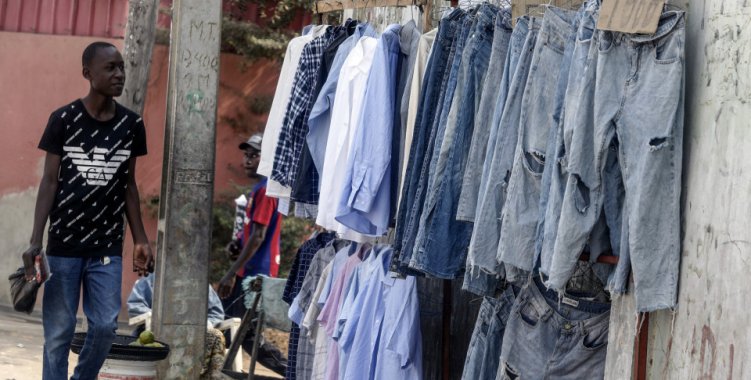For those who want to buy used clothes, at least in the province of Luanda, the country's capital, it is not difficult to find women sitting on the streets with their clothes displayed on the floor or walls, and there are also those who choose to "zungar" [street sales] with their clothes hanging on hangers.
In the city of Luanda, customers buy clothes and shoes at more affordable prices, trying them on as if they were in a boutique.
The range of products on offer in the outskirts of the city is increasing, from clothing for adults and children, including underwear, to socks, shoes, bags for women, backpacks for children, belts, household items such as bed linen and bath linen, pillows, curtains, crockery, jewelry, paintings, toys, party and wedding dresses, among many other products.
The sale of "baldos" is becoming increasingly sophisticated, and in addition to the streets and squares, they are also sold through social networks, with the possibility of home delivery, usually advertised by digital influencers.
This business, which has been operating in Angola for several years, is mainly dominated by foreign citizens, who import goods from countries in Europe, America and Asia, mainly used products, some still with tags because they were never used by their previous owners.
But according to the operators, in the last two years, business has been "doing badly", as Abdul Magza, manager of one of the warehouses located in the municipality of Cazenga, on the outskirts of Luanda, in the former Indústria Fosforeira de Angola (IFA), considered the area where the highest quality products can be found, complained to Lusa.
As for the profits and amounts collected from this business in Angola, which is among the African countries that import the most used clothing, the businessmen prefer not to give figures.
Abdul Magza, a Lebanese citizen who has been in this business for five years, says that "everything has changed", referring to the prices that have increased due to the exchange rate fluctuation, and he is now finding it more difficult to resell the products.
"It's getting difficult for those who come to buy to resell, it's not working out," said Abdul Magza, recalling that previously every week they would unload containers with 500 to 600 "bale balloons" (packages of used clothing for resale) from Dubai.
But now, up to four months go by "without any news", the main secret, and the most attractive, of this business.
This difficulty in acquiring the product was confirmed by Catarina Costa, 48 years old, who has been selling "bale" from Canada, Turkey, the USA and other countries for 20 years, except from China because "it's not of good quality", choosing the IFA warehouses as her source.
Catarina Costa said that the supply "has decreased a lot" because many business owners have closed their warehouses and "left" due to economic difficulties.
"Most of the stores are closed because, they say, the business is no longer profitable," said this saleswoman located in Largo do Pelourinho, in the city center, who bought the last "bale of bales" of pants from the USA for 140 thousand kwanzas, expecting a profit of 5 thousand kwanzas or 10,000 kwanzas.
Maria Natália, currently 39 years old and who has been selling bales since she was 15 – a business that is a tradition in her family – said that she still manages to support her five children.
This trader also prefers the "bale" from Turkey, which she buys at the IFA, because "the bales from China [customers] don't buy", as they are small sizes, which are difficult for Angolans to fit.
When asked who buys her products the most, Maria Natália said that her customers vary, but she already has some loyal customers, at the Ministry of Finance, at Sonangol and several other employees in downtown Luanda, to whom she even makes "kilapi" [credit] in order to sell.
Customers prefer "baldo" pieces, because they are "rare clothes", that is, they are not commonplace and are of good quality, and some international brands can be found, the shopkeeper explained.
Amílcar Alberto, manager of a warehouse at IFA, said that they have not received any goods for almost seven months and are only shipping what they have in stock, because importing is difficult due to the increase in taxes and the currency crisis.
According to Amílcar Alberto, the import tax has increased by around 30 percent, from the previous 30 percent to almost 60 percent, with non-governmental organizations and religious institutions remaining exempt from this tax obligation.
In addition to the IFA, China Town also supplies this market, at lower prices, with smaller "bale balloons" weighing between 15 and 25 kilos, compared to those coming from the West, weighing between 45 and 60 kilos, explained Amílcar Alberto.







